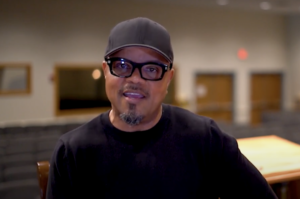In late July, the congregation of Calvary Chapel Cary in Apex, North Carolina, was shocked to discover its own church listed for sale online for $11.5 million with a pending buyer. Then, as mysteriously as it appeared, the listing was canceled.

Calvary Chapel Cary Pastor Rodney Finch from 2020 / Video screenshot
Less than a week later, fresh from a five-week sabbatical, Pastor Rodney Finch resigned as senior pastor.
“This is our last Sunday,” Finch announced on August 4 during his morning sermon, according to audio provided to MinistryWatch. “Effective today, I’ll be saying goodbye. I’ll be taking a backseat here at the church.”
Finch’s sermon concluded a tumultuous tenure marred by multiple scandals, a slew of staff resignations, a shrinking congregation, and an investigation by the leadership council of the Calvary Chapel Association.
Finch confessed to the church that he had secretly conspired with the board of elders as far back as January to find a buyer for the church building and nearby parking lot, keeping it secret until a deal was brokered. But before he could break the news the way he wanted to, the congregation found out.
The reason for the sale, he said, was that he had planned to resign in 2025 and did not think the church could survive financially without him unless it moved to a cheaper location. He also suggested he had already decided during his sabbatical to resign early—not because of the scandal but in order for the other pastors to “set their plan in motion” and “begin to congeal as a group.”
“When a pastor with this longevity leaves the ministry… it is statistically factual actually that a percentage of the church leaves as well,” Finch said. “Our mortgage here at Calvary Chapel is quite a large dollar amount… With my exit, that would greatly impact the ability of the church to meet monthly expenses.”
Financial Secrecy
For years, the financial standing of Calvary Chapel Cary has been a question mark even to leadership due to a lack of transparency. Signed statements from former staff, submitted to the CCA council in 2019, and recently provided to MinistryWatch, allege that Finch refused to share budget information or even the church by-laws with his own team, that he and his wife used church credit cards with zero accountability, and that he made purchasing decisions without the board’s approval.
Access to MinistryWatch content is free. However, we hope you will support our work with your prayers and financial gifts. To make a donation, click here.
This crisis of financial accountability came to a head with the “Nehemiah Project.” Between 2012 and 2017, the church aggressively solicited restricted funds to build a new church—but that church was never built.
“In 2017, after I came on staff, we were told to tell anyone who asked about the Nehemiah project that the funds had been used to make repairs and improvements on the current buildings and as a reserve for future building repairs,” wrote one former staff member who had donated $50 every week during those five years. “This was never announced to the general congregation.”
Nelson Henry Jr., a former assistant pastor, wrote that Rodney often used his church credit card without providing receipts, would “consistently book first-class travel accommodations,” and paid full-time salaries and benefits to family regardless of whether they even showed up for work.
“Pastor Rodney told me that he had his church bi-laws written in such a way that his church council was advisory only,” Henry said. “He could not be forced to take a sabbatical or step down temporarily due to inappropriate behavior unless he consented. He had complete control of who was on the council as well. This is not accountability”
The lack of transparency extended to Finch’s long struggle with a drug addiction he hid from the congregation even as he pushed the board to cover $50,000 of a luxury rehabilitation program with church funds—a program he then left early without telling anyone.
“He was able to be addicted to drugs for decades, make the church pay for an expensive rehab program which he did not complete, and walk right back into the pulpit as if nothing happened,” Henry said.
As the scandals unfolded, church attendance began to drop from about 2,000 people to reportedly hundreds. MinistryWatch was unable to immediately confirm the current size.
Apology
Though the church intends to continue with the plan to sell and move, Finch confessed during his resignation speech that he was wrong to keep it secret.
“Please forgive me, on behalf of the board. Forgive me. That was not the right thing to do. It was the wrong thing to do,” Finch said. “We should have immediately, once we made the decision that we were going to need to relocate the church, we should have come to you.”
Finch was unclear on whether he would continue to be involved in Calvary Chapel Cary and noted he and his wife Elvira still have “a lot of ministry left in us.” And though the board was complicit in the secrecy, no one else offered resignations. Finch called out by name pastors Ralf Stores, Tim Fontaine and Scott Burrell as being among those who will fill his shoes.
Later in the service, Stores announced the church’s intent to move to a “plurality of leadership” and promised greater transparency and accountability.
“We are going to over-communicate,” Stores said. “You’ll be sick of it. It will be transparent. It will be timely communication accurate at every level. What is going on, where we are going, financial transparency, board transparency, elder transparency, you will see and a promise from us as elders we will be available, we will be approachable, we will be accessible, and we will be accountable.”
Stores did not specify whether transparency will mean making the by-laws and board meeting minutes public, and Calvary Chapel Cary did not immediately respond to a request from MinistryWatch to provide those documents.
Symptom of a Wider Problem
Finch’s ability to remain in the pulpit for about 30 years despite many complaints against him is, in part, due to the structure of the Calvary Chapel Association and its “Moses model” of leadership, which grants senior pastors enormous power and autonomy over their churches.
Some argue that unless that power is curbed, misbehaving pastors will continue to be unaccountable.
For example, when CCA’s leadership council conducted its investigation into Finch in 2019, one council member, Calvary Chapel Stone Mountain Senior Pastor Sandy Adams, reported approaching Finch with “concerns” but admitted CCA was unable to “administer discipline.”
The absence of an official membership process for CCA attendees puts them on the sidelines while elders are encouraged to support the senior pastor and overlook wrongdoing.
The most extreme form can be found in prominent CCA pastor and author Larry Taylor’s book, “The Ministry of an Assisting Pastor,” in which he argues elders owe “unconditional loyalty” to their pastor and should resign rather than expose wrongdoing even if it puts the church in “spiritual danger.”
EDITOR’S NOTE: Why does MinistryWatch report on financial fraud in the church? We report on them because one in three churches will be victimized, according to the Center for the Study of Global Christianity. We also report on them because these crimes have real victims and cost taxpayers and other stakeholders billions of dollars every year. Even small crimes in small churches have huge consequences. We also report on them to remind our readers that they do not have to be victims. There are steps you can take to prevent financial waste, fraud, and abuse in your church or ministry. To find out more, click here.
